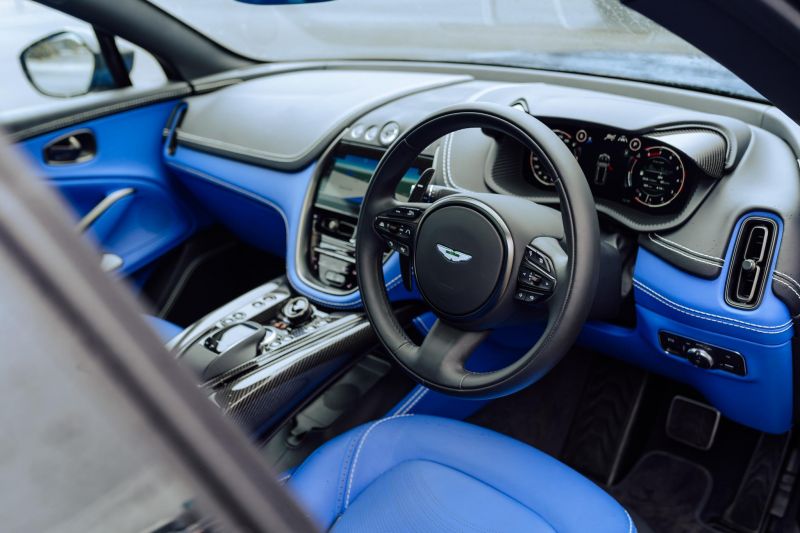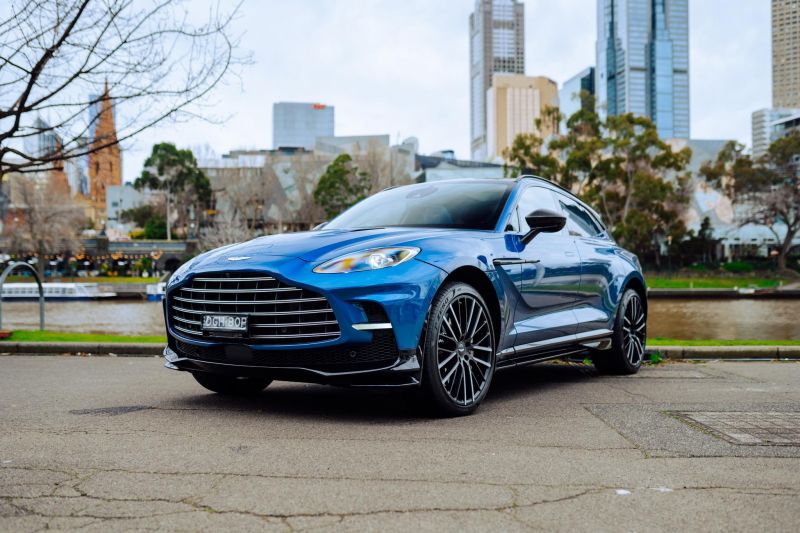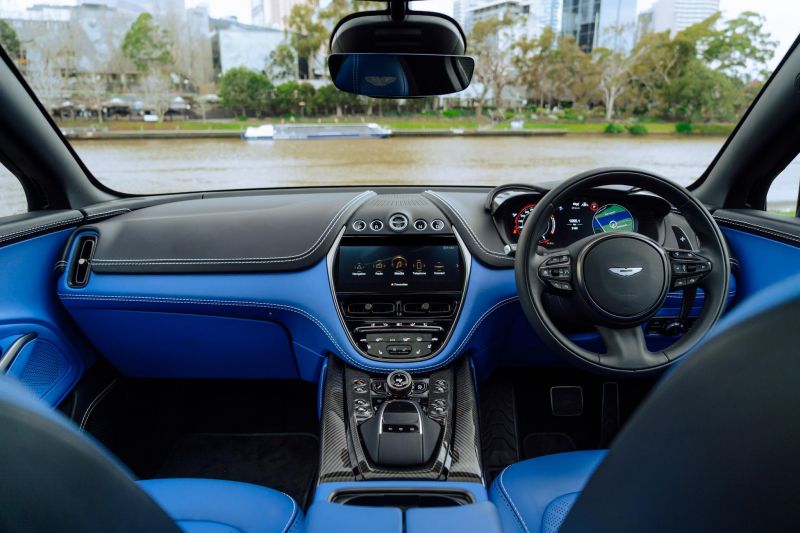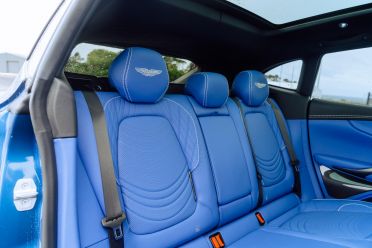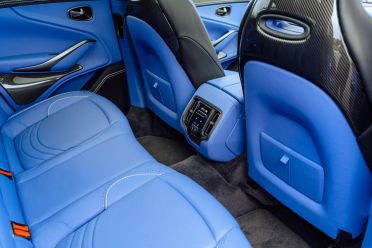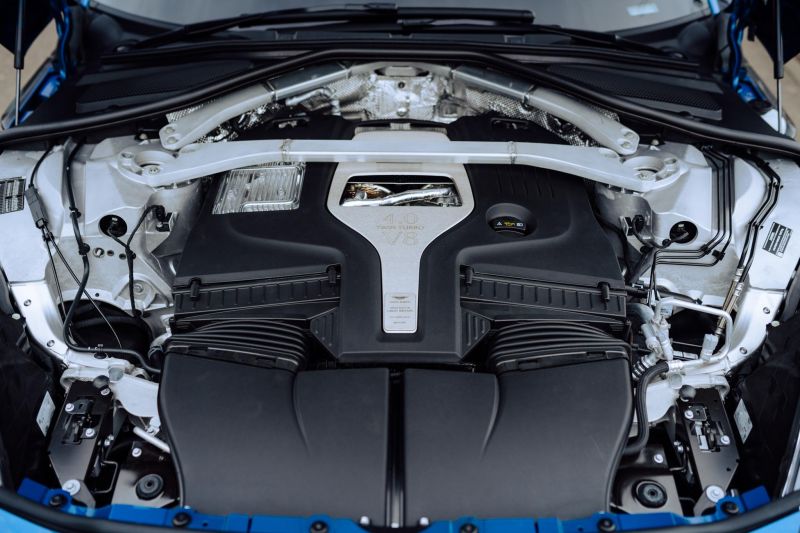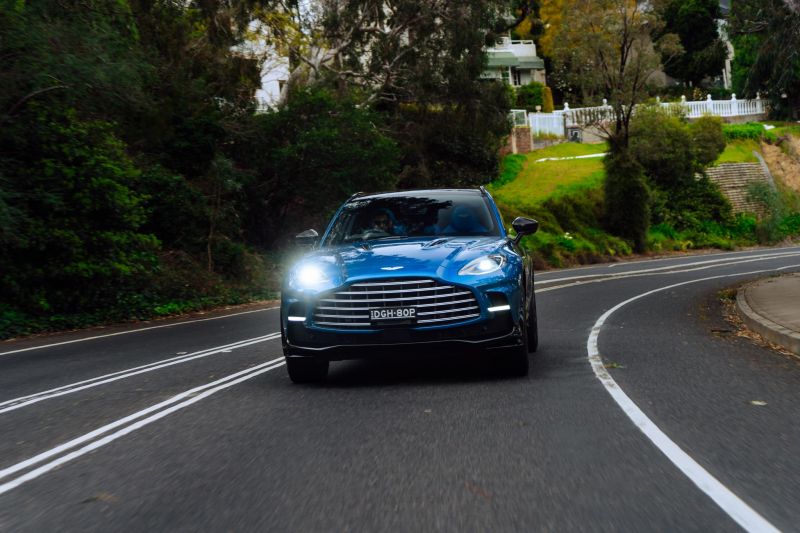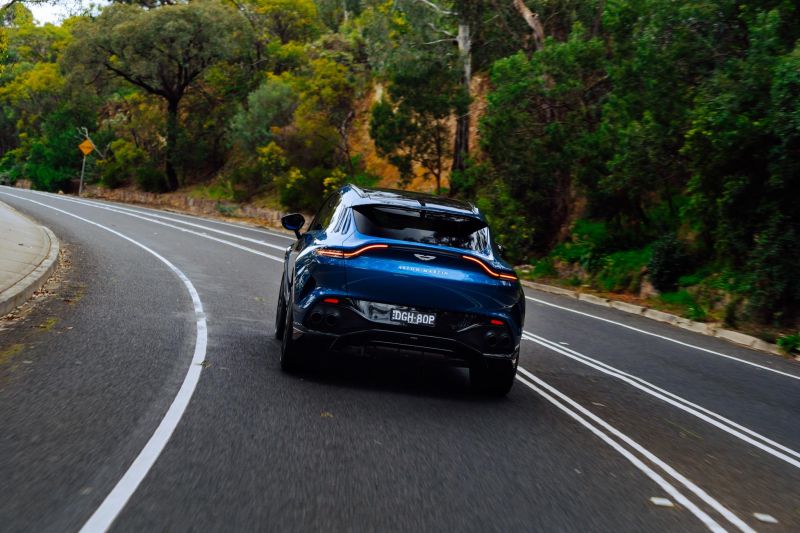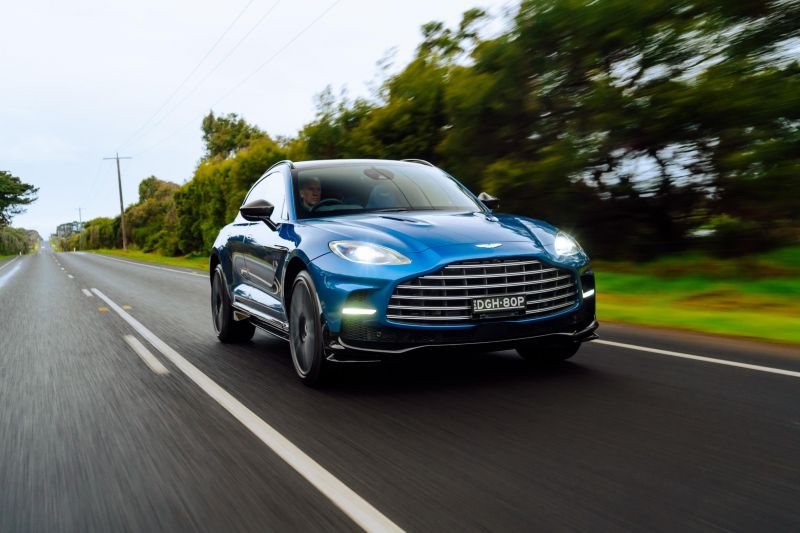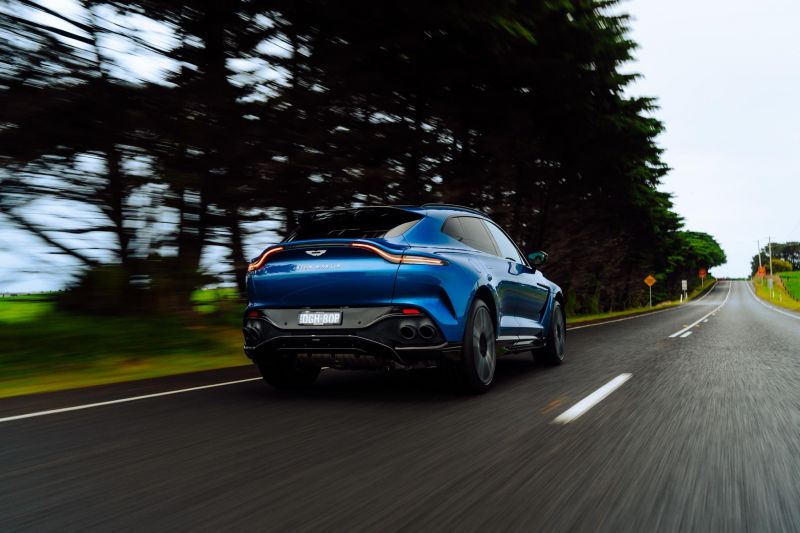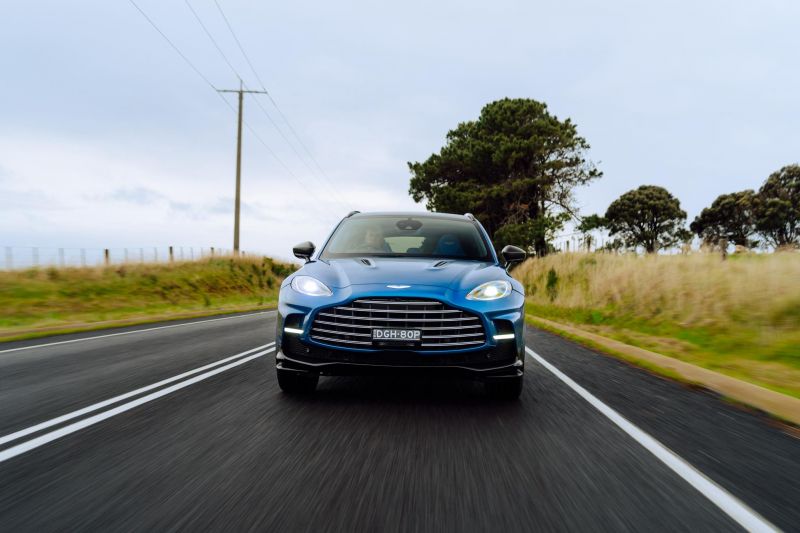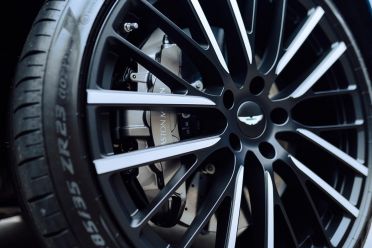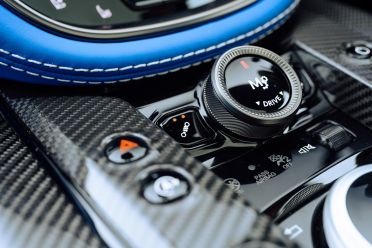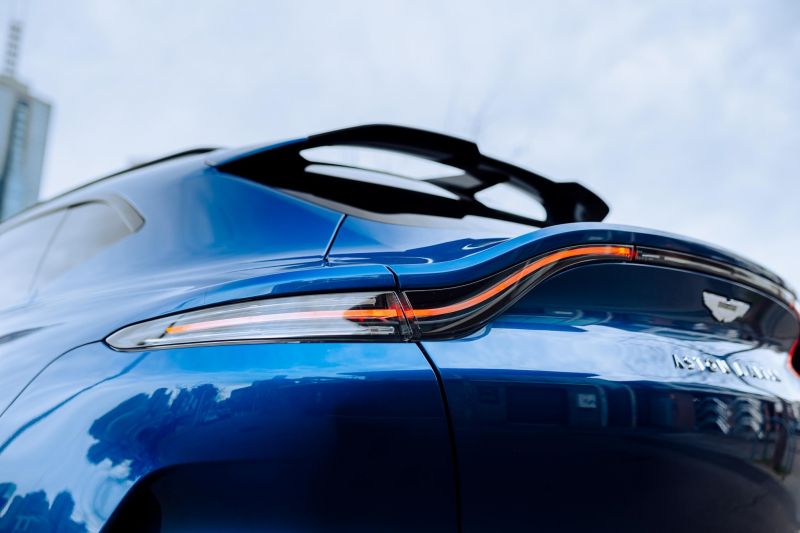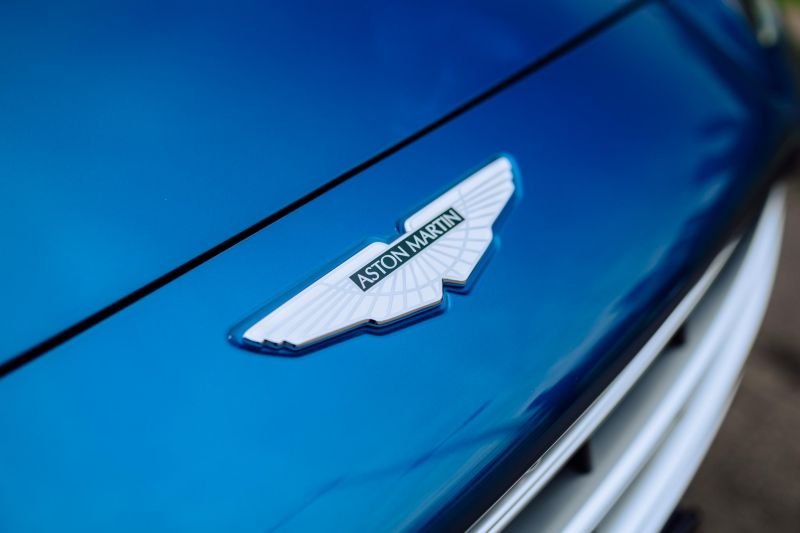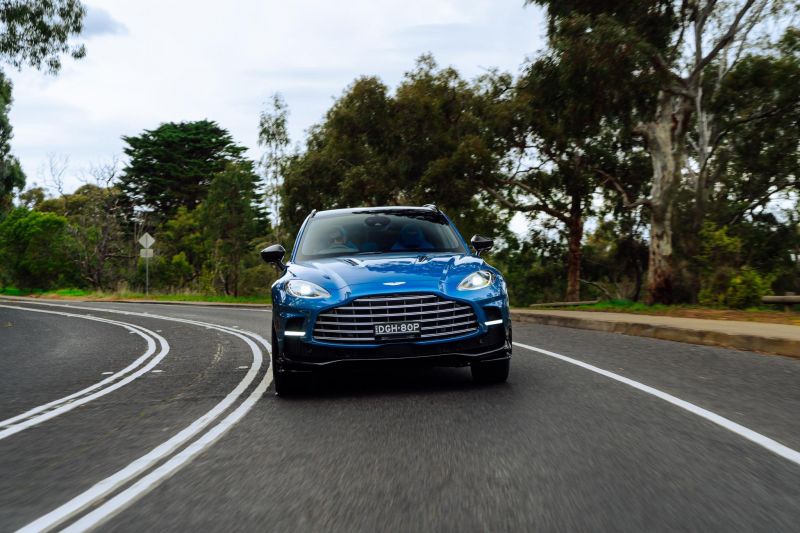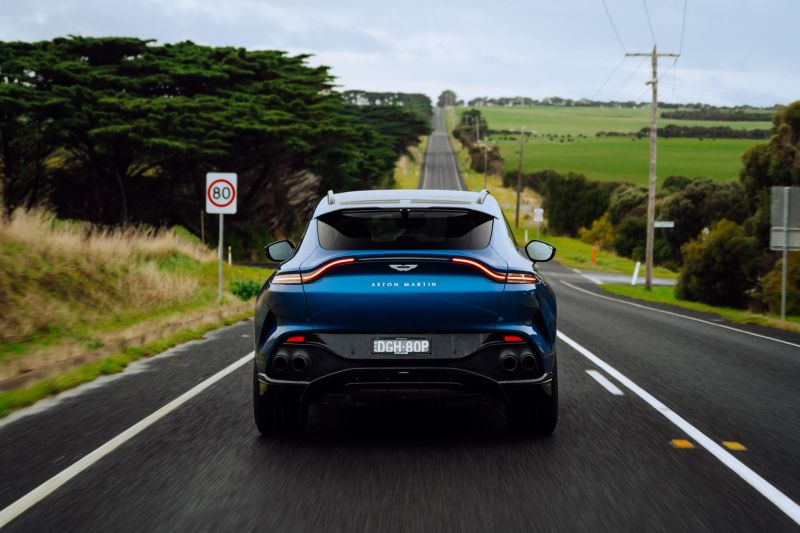Pushing Aston Martin’s hugely powerful DBX707 at a proper nine-tenths through endless hairpins and back-to-back twisties high above the Sardinian coastline was proof that Aston’s ultra-luxury SUV was the new benchmark in performance and luxury in a crossover.
In fact, so adept was it at smashing corners and dashing from point-to-point at supercar speeds for hours on end, it was almost impossible to find fault with the high-riding Aston in terms of outright pace, dynamics and comfort. It balanced all-three metrics flawlessly.
The steering was fast and accurate, but not too quick as to feel nervous; while throttle response, power delivery, gear ratios and brake calibration were all beautifully linear and engaging at the same time.
But from a co-driver’s perspective on the return journey back to our accommodation, it was an entirely unpleasant experience. Too many corners, too much braking, and too much G-force was altogether stomach curdling. So much so, I had to ask my driving partner to ease up on the race braking. Suffice to say I’m not the best passenger.
Nevertheless, all the major mechanical controls operated in perfect sync, while pedal feel was utterly natural, allowing for the tiniest changes with throttle, steering and brake inputs.
It drove like a full-fat supercar, yet you were perched high enough for a grand view of the stunning idyllic island off the coast of mainland Italy.
However, a question remained at least from an engineering perspective. Could the more luxurious Aston stay with the likes of the Lamborghini Urus Performante and close cousin the Porsche Cayenne GT Turbo on the racetrack?
Some might argue the absurdity of putting a 2300kg V8-powered behemoth on track to drive at the same level of intensity as its more focused Lamborghini and Porsche contenders.
I had my doubts as the venue was the demanding Sydney Motorsport Park (minus the kink), and it was a night session under not-so-great lights.
How does the Aston Martin DBX fare vs its competitors?
View a detailed breakdown of the Aston Martin DBX against similarly sized vehicles.

Aston Martin
DBX
How much does the Aston Martin DBX707 cost?
Commanding a price premium of just $40,600 over the ‘standard’ Aston Martin DBX, the flagship DBX707 is priced from $428,400 before on-road costs.
Compared with its closest rivals in this rarefied league of extraordinarily capable luxury SUVs, the big Aston stands as a bargain.
Range-topping makes and models include the Bentley Bentayga Speed priced from $531,500, as well as the Lamborghini Urus Performante ($465,876), Maserati Levante Trofeo ($364,700) and Porsche Cayenne Turbo GT ($364,700).
However, in this rarefied end of the automotive world, there’s almost no such thing as a standard purchase. Cashed-up buyers like to personalise their vehicles with specific options and pricing rarely comes into it.
Take our Plasma Blue, track ready DBX707 at this event. It was fitted with just nine tasty optional extras including grey brake calipers, signature metallic paint, Q semi aniline leather palette, power tailgate with gesture control, interior jewellery pack – Q – 2×2 twill carbon-fibre trim with dark satin chrome, contrast stitching, tail lights smoked, trim inlay – gloss 2×2 twill carbon-fibre and 23-inch forged satin black diamond turned alloy wheels – very special.
All of that bumped the princely price of our Aston Martin DBX707 tester to $526,000 excluding on-road costs.
What is the Aston Martin DBX707 like on the inside?
If Saville Row were a car brand it would most likely be an Aston Martin DBX707 these days, given the first-class space afforded to passengers and the beautifully embellished interior boasting lashings of carbon-fibre, hand-stitched semi-aniline leather and bronze metal mesh veneer.
The standard-fit Sports seats (Comfort seats are a no-cost option) are simply superb for the level of comfort and lateral support they provide, regardless of the kind of driving you’re doing.
But those fitted to our tester are more special again, especially given they’re hand-crafted in super-soft, semi-aniline leather in exquisite Cote d A’zure Blue with contrasting crème stitch.
It’s the multiple layers of cushioning throughout the entire seat and seat-back that make them feel more like your favourite armchair rather than something capable of supporting your torso in an all-out track attack at Sydney Motorsport Park.
The entire cabin oozes ultra-luxury and while the leather craft looks a bit out of place on a race track, more than anything else in the cockpit it’s the double-twilled glossy carbon-fibre trim which points to the high-powered nature of this ballistically quick family hauler.
The perfectly round hand-stitched steering wheel is a rare sight in this age of awkward flat-bottom versions. The leather is soft to the touch and the thickness of the rim is comfortably sized, like those used by Porsche.
Most of what you see is pretty much standard DBX fare complete with rotary Manettino dial for switching drive modes or engaging a genuine manual mode – the proper kind that holds the gear ratio until it’s bouncing off the rev limiter until you decide to pull a paddle.
It’s flanked by a series of shortcut buttons (real buttons) including an active exhaust switch that opens the valves up on the quad tailpipes, without being in ‘Sport’.
And while the big 12.3-inch digital driver’s display meets the current required level of modernity, it’s the smaller 10.25-inch central screen that looks and feels a decade old compared to its rivals.
Interior space is what you might expect of a 5.0-metre-long crossover, offering plenty of space for five adults; although, two passengers (rather than three) in the 40:20:40 split-folding rear-seat accommodation would make it a far more comfortable place to be on longer journeys.
Rear-seat leg room is more than adequate for those of average height, though taller frames might find it a bit tight back there. Boot space; though, is a plentiful 638 litres behind the second row, along with a practical load height and a reasonably wide aperture for easy loading of larger boxes.
What’s under the bonnet?
There’s not much to see when you pop the bonnet on the DBX707, besides the ‘hand built‘ build plate, but lurking under all the plastic sits one of the most powerful V8s ever produced.
It’s a 4.0-litre bi-turbo V8 powerhouse making 520kW (707PS) of power at 6000rpm and a ground-shaking 900Nm of torque from 4500rpm, delivered through a new nine-speed wet-clutch transmission.
As far as rivals go the Bentley Bentayga Speed only produces 467kW from its monster-size W12 engine, while making the same 900Nm of torque. Even the more track-focused Lamborghini Urus Performante and its Porsche Cayenne Turbo GT Coupe cousin can only muster 490kW/850Nm and 485kW/850Nm respectively.
Despite its huge price tag approaching $1 million, some will want to compare the Aston with Ferrari’s Purosangue – a genuine four-seater powered by a naturally aspirated V12 that makes 533kW of power and 716Nm of torque.
Interestingly, all except the Bentley (3.8s) are capable of rocketing from standstill to 100km/h in just 3.3 seconds.
How does the Aston Martin DBX707 drive?
Personally, I’d prefer my Aston Martin DBX707 to belt out a few more decibels and especially when you’re flat stick down the main straightaway at Sydney Motorsport Park.
That’s not to say you can’t hear the bellowing twin-turbo V8 as you let loose at full noise up the hill out of turn five, intoxicating as that is, it’s just that I figure genuine enthusiast-type 707 buyers might just want the volume dialled up a smidge.
It’s hard to imagine driving hell for leather on a race track in a family-friendly SUV that tips the scales at a hefty 2245kg, but that’s how far things have come these days with dynamic engineering and the sorcery of weight balance and traction though advanced hardware and software tuning.
Much of the DBX’s superb handling credentials are down to its active roll control. This tech keeps this full-size SUV bolt upright even through the tightest bends. It also means small mid-corner adjustments are possible with steering and throttle, in particular.
Nevertheless, it’s a lot of momentum to harness at big speeds and under big loads. Thankfully, the DBX707 is equipped with huge carbon-ceramic brake discs all-round, with equally large calipers to ensure consistent stopping power – lap after lap.
We weren’t holding back either, the two DBX707 testers were on the go, session after session. There were only very short pit-lane stops purely for driver changes and yet the high-speed braking was simply flawless all night.
A fast-flowing racetrack like SMSP is an ample enough arena to expose any weaknesses when it comes to cornering and steering feel, not to mention throttle and brake calibration; two elements which can make or break a high-performance vehicle, particularly an SUV.
And while you’re definitely aware of the Aston’s mass in the tighter turns, it’s also inspiring for how accurately it can keep its line, as well as the high level of traction and grip on offer from those huge Pirellis at the rear, which do wonders to encourage driver confidence.
We’re already three four-lap sessions in and I’m utterly surprised at how track focused the Aston is and how you can really throw it around.
Surprised, because it’s the DBX707 that gets the ride/handling balance absolutely spot on – compared with the Urus Performante and Cayenne Turbo GT. Both of these might be a tad sharper on the racetrack but slightly less comfortable as a daily; although, the Porsche isn’t far behind.
Just as I found on the road drive in Italy, you keep upping the ante – a little more commitment with each and every lap, and somehow its feels just as good from behind the wheel – so you really start to put the pedal down.
It’s easy to forget just how quick the this DBX is. Once you hit third, you’ve got all 900Nm under your right foot. I’m not sure what my terminal speed was down the main straightaway, but 260km/h seems probable and I what I think I saw in a split-second glance.
Remember, the Aston is capable of hitting 310km/h at full tilt, provided you’ve got enough clear tarmac.
Not surprising either, given it’s the Aston that was originally billed as the world’s most powerful combustion-engined luxury SUV when it launched. If we leave aside the stratospherically-priced V12-powered Ferrari Purosangue, that’s still the case.
Again, it’s the linearity with the mechanical controls that’s most appealing here. It’s another element that enables the driver to properly pedal the big Aston with similar levels of bravado as you would in a well-sorted hot hatch.
Honestly, performance like this in a vehicle ostensibly designed as a high-riding luxury grand tourer shouldn’t be possible, but somehow the engineering behind it defies the laws of physics.
And while we acknowledge most DBX707 owners probably won’t go anywhere near a track, it’s also reassuring to know it’s got such an all-encompassing breadth of capability.
I’m using manual mode with paddleshifters, but it’s just as responsive in the dialled-up Sports+ and letting the nine-speed auto do its thing.
For an automatic (with a wet-clutch), it’s properly sharp, but most of all, super smooth and refined.
What do you get?
Key upgrades for the Aston Martin DBX707 over DBX
- 520kW/900Nm 4.0-litre bi-turbo V8 (up 115kW/200Nm)
- Electronic limited-slip rear differential
- Carbon-ceramic brakes (420mm front, 390mm rear)
- Re-calibrated air-suspension, steering and active anti-roll bars
- Race Start launch control system
- Aerodynamic exterior styling package
- 16-way electric front seats
- Rotary Manettino dial with manual override function
DBX707 highlights:
- 22-inch Sport alloy wheels in gloss black, diamond turned
- Bi-LED headlights
- Approach illumination
- Solid exterior paint
- Aston Martin Designer key
- Power tailgate
- Sport steering wheel
- Sports exhaust system
- Front seats, door mirrors with 3-position memory
- Power-folding door mirrors
- Auto-dimming, heated exterior door mirrors
- Keyless entry and start
- Auto-dimming rear-view mirror
- Double sun visors (windscreen, side windows)
- Auto lights and wipers
- Ambient lighting with 64 colours
- Park assist
- Front, rear parking sensors
- 360-degree camera system
- Sports pedals – satin chrome
- Anodised sill plates with Aston Martin wings
- Carbon ceramic brakes – front, rear
- Wireless charging
- 12.3-inch digital instrument display
- 10.25-inch central infotainment display
- Premium Audio system (800 watts, 14 speakers)
- DAB digital radio
- Apple CarPlay
- Satellite Navigation
- Battery conditioning connection
- Adaptive triple-chamber air suspension
- Tri-zone climate control
- Electrically adjustable steering column
- Standard Exterior Package Upper Gloss Black
- Side strakes
- Window surrounds
- Roof rails
- Bonnet blades
- Door mirror caps
- Standard Exterior Package Lower Gloss Black
- Body colour Sport front bumper
- Sport front splitter
- Front aero winglets
- Sport door sill extensions
- Rear diffuser with gloss black diffuser wing
- Rear aero winglets
- Body colour vented rear wheel arches
- Standard interior environment accelerate
- Alcantara/leather upholstery
- 16-way Sport electric front seats with memory
- Heated front, rear seats
- Embroidery – Aston Martin wings
- Interior jewellery – Dark satin chrome
- Micro-perforation
- Alcantara headlining
Options as tested:
- Front grille finish – Dark
- Black chrome AML wings badging and script
- Multiple 22-23-inch wheel options
- incl. Sport, Ribbon and Forged in Silver, Satin black, Satin black bronze and Textured black
- Brake calipers (Red, Grey, Yellow, Bronze and Orange)
- Carbon-fibre exterior packages for upper and lower body
- Interior environments including, Inspire Comfort and Inspire Sport
- Seat ventilation
- Heated Alcantara steering wheel
- Trim inlay including Gloss 2×2 twill carbon-fibre, Q-Gloss Bronze Mesh
- Jewellery Pack including Satin Chrome, Gloss 2×2 twill carbon-fibre with dark chrome
- Smoked tail lights
- Rear privacy glass
- Rear acoustic privacy glass
- Power tailgate with gesture control
- Space saver spare wheel
- Electric deploying tow bar
- Remote park heat
- Heavy pile floor mats
- Umbrella and holder
Is the Aston Martin DBX707 safe?
Despite the absence of an ANCAP or EuroNCAP safety rating – given the cost of crash testing such high-priced vehicles – the DBX707 is otherwise equipped with the following suite of active and passive safety systems.
- AEB incl. Pedestrian detection
- Adaptive cruise control
- Blind-spot warning
- Forward collision warning
- Lane departure warning
- Lane keep assist
- Lane change warning
- Rear-cross traffic alert
- Traffic sign recognition
- Door-opening warning
- Airbags (front, side and curtain)
- ISOFIX on outer rear seats
How much does the Aston Martin DBX707 cost to run?
The DBX707 is covered by Aston Martin’s standard three-year, unlimited-kilometre warranty; along with three-years roadside assist.
Service charges will vary with dealers but with the standard 12-month scheduled service it will likely be similar to the cost of servicing the regular DBX V8 which is between $1700-$1900 per visit.
Aston Martin claims 14.2L/100km fuel consumption on premium 98 RON petrol on the combined cycle using the WLTP standard.
CarExpert’s Take on the Aston Martin DBX707
At the international launch after an all-encompassing road drive, I concluded the DBX707 was the clear benchmark in the high-performance luxury SUV stakes due to its outstanding ride/handling balance and daily usability – never mind its bespoke luxury.
While it’s on-track performance won’t matter to most buyers, I still had my doubts as to whether the Aston would measure up to its more focused rivals from Lamborghini and Porsche.
It wasn’t patently obvious from the first session but by the end of the night, it’s fair to say I was pretty much gobsmacked at just how easy it was to pedal the DBX707 around a race circuit – and with a fair degree of precision.
It’s not quite as manic or as pinpoint sharp as the Urus Performante, but even then, there’s not much in it. It just feels easier and less edgy in the Aston. It’s certainly more comfortable and less demanding on the driver.
There’s still no other in the segment that can deliver such a unique combination of Saville Row craftsmanship with supercar levels of handling and sheer go on track. For that, it’s unique within the segment.
It’s still an engineering triumph to be celebrated, even if the infotainment system falls way short of the mark.
Click the images for the full gallery
BUY: Aston Martin DBX
MORE: Everything Aston Martin DBX

